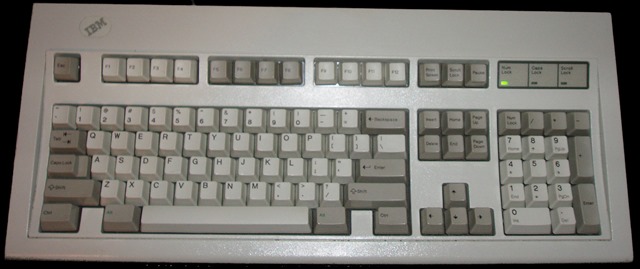The title of this post is terribly misleading. I would apologize for that, but that would imply I regret having misled you. In fact, that was my evil intention all along. It’s not controlling operating systems and applications from the command line with which I want to dispose, it calling keyboard controls by the insidious name “keyboard shortcuts.” It’s not using keyboard shortcuts, it’s the term “keyboard shortcuts” that here draws my ire.
The Primacy and Superiority of the Keyboard
Using the keyboard to control a computer is the oldest and best form of interaction with the machine. Input via other means are, at best, useful augmentations to this primary input. There may be a time in the future when that changes.
Speech has the potential to become a better way. It’s not to that point, though, except at times when keyboard use is impractical or impossible, mostly in mobile use cases. Input directly from your thoughts into the machine via some sort of mind embed or thought-wave reading device would probably be the ideal form of input if that ever becomes a reality (though imagine the privacy and security concerns around something like that). Touch is nice for some uses and some things and works extremely well on small devices and with mobility as a primary concern.
When all other things are equal, though, especially when sitting (or standing) at a desk, the keyboard is still king.
Permanent Beginners
Because of the primacy of the keyboard in interacting with machines, calling input via the keyboard shortcuts is both a reflection and a contributor to the mentality destroying productivity in the world today. The context switch between keyboard and mouse and back again is more costly than we tend to think. Controlling your applications with the keyboard is the best way to interact.
Calling keyboard controls shortcuts implies that mouse controls are the default and normal way to interact with a machine and you only use keyboard controls if you are different from the norm. Unfortunately, that is the case. Learning how to use your tools and interact with a machine optimally is done only by a minority of computer users.
This is suboptimal.
It’s worse the suboptimal, it’s counterproductive. Using menus and pointer control to get something done is useful because of discoverability and helps beginners. If you are using an application on a regular basis and haven’t figured out how to do what you need to do in better ways, you are still a beginner. You can do better.
Does the Term Matter?
You are not shortcutting the right way to interact with your operating systems and applications by using the keyboard to control your activity, you are controlling the output using the best input. You are using keyboard controls, not “keyboard shortcuts.” Yes, I know I’m just getting hung up on words and it is typically of little consequence how you refer to these things. Yes, I know the shift I’m calling for here is subtle and may not matter. A rose by any other name…..
I’m really talking, though, about a change in the mentality of computer users, especially developers (who should know better), and a changing of priority. If you want to say “I’m using keyboard shortcuts” and make that your primary way of interacting with your computer, I’m ok with that.
Language matters, though. What you mean is more important than what you say, but what you say has an impact on what you mean and, more importantly, what you communicate.
The point of my rant here is not really about the word, but that I just think the term gives away an emphasis that is counterproductive. Life if better when you know how to use your chosen tools and control them from the keyboard. In such a life, the keyboard is not a shortcut, it’s a way of life.
The Keyboard as a Proxy for How you Live Your Life
And there’s a larger point about life: It is fine to discover what and how you want to do things via many paths and not necessarily knowing the best approaches. It is good to have a surface-level understanding of many things and to have a broad knowledge. For those things, though, in which you specialize – those things you do on a regular basis, those things you mention when asked “So, what do you do?” – you must learn how to do them the best way you can.
Clicking around on your mouse, knowing you could be doing what you are doing better and more optimally is a proxy for how you live your life. “How you do anything is how you do everything.” (This quote is attributed to so many different sources I cannot possibly trace it to a real origin, let’s just call is a proverb.)
That’s where I want to be and, ideally, I want you there with me. We’ll be better together.


